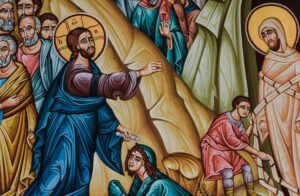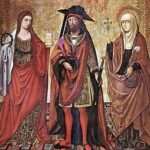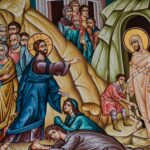John Chapter 11:1-57 King James Bible KJV

Jesus’ Arrival and Martha’s Faith, the Illness and Death of Lazarus, the Miracle of Raising Lazarus, Reactions to the Miracle
John Chapter 11:1-57 King James Bible KJV. John Chapter 11 is a pivotal chapter that prepares readers for the climax of Jesus’ life, death, and resurrection. It illustrates the depth of his love, his divine authority, and the hope he offers through faith. It centers on the story of Lazarus, a man from Bethany who becomes ill and dies, only to be raised from the dead by Jesus. This chapter is significant for several reasons and provides deep insight into Jesus’ nature, his relationship with humanity, and the concept of resurrection and eternal life.
Key theological themes include:
- Faith in Jesus as the Resurrection and Life: Jesus’ statement, “I am the resurrection and the life,” highlights that eternal life and resurrection are available through faith in him, bringing both comfort and hope to believers.
- God’s Timing and Purpose: Jesus’ delay in coming to Lazarus may have seemed insensitive, but it served a higher purpose in demonstrating God’s power over death, reinforcing the concept of divine timing.
- Compassionate Nature of Jesus: Jesus weeping with Mary and Martha emphasizes that God is not distant from our pain and grief; he fully participates in human experiences.
- Foreshadowing of Jesus’ Own Death and Resurrection: Lazarus’s resurrection is a powerful precursor to Jesus’ own resurrection, underscoring the ultimate victory over death that Jesus would achieve on behalf of humanity.
John Chapter 11:1-57 King James Bible KJV
—————-

The Illness and Death of Lazarus – verses 1-16
Jesus learns that Lazarus, a close friend and the brother of Mary and Martha, is sick. Though he deeply loves them, he delays going to them for two days, saying, “This sickness will not end in death, but for God’s glory.” This delay is deliberate, as Jesus intends to reveal something deeper than simply healing Lazarus. By allowing Lazarus to die, Jesus creates a situation where he can demonstrate his power over death, foreshadowing his own resurrection.
This emphasizes the idea that God’s timing and purposes often extend beyond immediate relief from suffering, ultimately aiming for a greater revelation of His power and love.

Jesus’ Arrival and Martha’s Faith – verses 17-27
When Jesus arrives in Bethany, Lazarus has been dead for four days. Martha, Lazarus’s sister, greets Jesus and expresses faith that if he had been there, Lazarus would not have died. She shows remarkable faith in Jesus’ power, even after her brother’s death. Jesus tells her, “Your brother will rise again,” and she interprets this as a reference to the resurrection on the last day. However, Jesus declares, “I am the resurrection and the life. The one who believes in me will live, even though they die,” revealing that resurrection is not just a future event but is embodied in him.
This part of the chapter explores the transformative power of faith and how Jesus offers life in its fullest sense, transcending death.

Jesus’ Compassion and Grief – verses 28-37
Jesus meets Mary, Lazarus’s other sister, who is overcome with sorrow. Jesus is deeply moved and weeps alongside her. This moment, encapsulated in the shortest verse in the Bible, “Jesus wept,” illustrates his compassion and empathy with human suffering. His grief reflects God’s closeness and empathy toward human pain and loss, highlighting that God is not detached from our suffering.


The Miracle of Raising Lazarus – verses 38-44
Jesus approaches Lazarus’s tomb and commands that the stone be removed. Martha warns of the odor, as Lazarus has been dead for four days. Jesus reassures her of God’s glory and prays to the Father, thanking Him publicly so that people may believe. He calls out to Lazarus, who emerges from the tomb alive, still wrapped in burial clothes. This moment vividly displays Jesus’ divine authority and serves as a powerful testament to his power over death. This miracle foreshadows Jesus’ own resurrection and assures believers of his power to give life beyond physical death.

Reactions to the Miracle – verses 45-57
The raising of Lazarus leads many people to believe in Jesus, but it also intensifies opposition from religious authorities. The Pharisees and chief priests become more determined to kill Jesus, fearing his growing influence and the potential disruption it might cause to their political stability. This reveals the dual impact of Jesus’ ministry: it brings people to faith while also igniting opposition that ultimately leads to his crucifixion.
John Chapter 11:1-57 King James Bible KJV
1 Now a certain man was sick, named Lazarus, of Bethany, the town of Mary and her sister Martha.
2 (It was that Mary which anointed the Lord with ointment, and wiped his feet with her hair, whose brother Lazarus was sick.)
3 Therefore his sisters sent unto him, saying, Lord, behold, he whom thou lovest is sick.
4 When Jesus heard that, he said, This sickness is not unto death, but for the glory of God, that the Son of God might be glorified thereby.
5 Now Jesus loved Martha, and her sister, and Lazarus.
6 When he had heard therefore that he was sick, he abode two days still in the same place where he was.
7 Then after that saith he to his disciples, Let us go into Judæa again.
8 His disciples say unto him, Master, the Jews of late sought to stone thee; and goest thou thither again?
9 Jesus answered, Are there not twelve hours in the day? If any man walk in the day, he stumbleth not, because he seeth the light of this world.
10 But if a man walk in the night, he stumbleth, because there is no light in him.
11 These things said he: and after that he saith unto them, Our friend Lazarus sleepeth; but I go, that I may awake him out of sleep.
12 Then said his disciples, Lord, if he sleep, he shall do well.
13 Howbeit Jesus spake of his death: but they thought that he had spoken of taking of rest in sleep.
14 Then said Jesus unto them plainly, Lazarus is dead.
15 And I am glad for your sakes that I was not there, to the intent ye may believe; nevertheless let us go unto him.
16 Then said Thomas, which is called Didymus, unto his fellow disciples, Let us also go, that we may die with him.

17 Then when Jesus came, he found that he had lainin the grave four days already.
18 Now Bethany was nigh unto Jerusalem, about fifteen furlongs off:
19 And many of the Jews came to Martha and Mary, to comfort them concerning their brother.
20 Then Martha, as soon as she heard that Jesus was coming, went and met him: but Mary sat still in the house.
21 Then said Martha unto Jesus, Lord, if thou hadst been here, my brother had not died.
22 But I know, that even now, whatsoever thou wilt ask of God, God will give it thee.
23 Jesus saith unto her, Thy brother shall rise again.
24 Martha saith unto him, I know that he shall rise again in the resurrection at the last day.
25 Jesus said unto her, I am the resurrection, and the life: he that believeth in me, though he were dead, yet shall he live:
26 And whosoever liveth and believeth in me shall never die. Believest thou this?
27 She saith unto him, Yea, Lord: I believe that thou art the Christ, the Son of God, which should come into the world.

28 And when she had so said, she went her way, and called Mary her sister secretly, saying, The Master is come, and calleth for thee.
29 As soon as she heard that, she arose quickly, and came unto him.
30 Now Jesus was not yet come into the town, but was in that place where Martha met him.
31 The Jews then which were with her in the house, and comforted her, when they saw Mary, that she rose up hastily and went out, followed her, saying, She goeth unto the grave to weep there.
32 Then when Mary was come where Jesus was, and saw him, she fell down at his feet, saying unto him, Lord, if thou hadst been here, my brother had not died.
33 When Jesus therefore saw her weeping, and the Jews also weeping which came with her, he groaned in the spirit, and was troubled,
34 And said, Where have ye laid him? They said unto him, Lord, come and see.
35 Jesus wept.
36 Then said the Jews, Behold how he loved him!
37 And some of them said, Could not this man, which opened the eyes of the blind, have caused that even this man should not have died?

38 Jesus therefore again groaning in himself cometh to the grave. It was a cave, and a stone lay upon it.
39 Jesus said, Take ye away the stone. Martha, the sister of him that was dead, saith unto him, Lord, by this time he stinketh: for he hath been dead four days.
40 Jesus saith unto her, Said I not unto thee, that, if thou wouldest believe, thou shouldest see the glory of God?
41 Then they took away the stone from the placewhere the dead was laid. And Jesus lifted up his eyes, and said, Father, I thank thee that thou hast heard me.
42 And I knew that thou hearest me always: but because of the people which stand by I said it, that they may believe that thou hast sent me.
43 And when he thus had spoken, he cried with a loud voice, Lazarus, come forth.
44 And he that was dead came forth, bound hand and foot with graveclothes: and his face was bound about with a napkin. Jesus saith unto them, Loose him, and let him go.

45 Then many of the Jews which came to Mary, and had seen the things which Jesus did, believed on him.
46 But some of them went their ways to the Pharisees, and told them what things Jesus had done.
47 Then gathered the chief priests and the Pharisees a council, and said, What do we? for this man doeth many miracles.
48 If we let him thus alone, all men will believe on him: and the Romans shall come and take away both our place and nation.
49 And one of them, named Caiaphas, being the high priest that same year, said unto them, Ye know nothing at all,
50 Nor consider that it is expedient for us, that one man should die for the people, and that the whole nation perish not.
51 And this spake he not of himself: but being high priest that year, he prophesied that Jesus should die for that nation;
52 And not for that nation only, but that also he should gather together in one the children of God that were scattered abroad.
53 Then from that day forth they took counsel together for to put him to death.
54 Jesus therefore walked no more openly among the Jews; but went thence unto a country near to the wilderness, into a city called Ephraim, and there continued with his disciples.
55 And the Jews’ passover was nigh at hand: and many went out of the country up to Jerusalem before the passover, to purify themselves.
56 Then sought they for Jesus, and spake among themselves, as they stood in the temple, What think ye, that he will not come to the feast?
57 Now both the chief priests and the Pharisees had given a commandment, that, if any man knew where he were, he should shew it, that they might take him.
You must be logged in to post a comment.